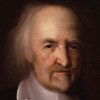“ Socrates begins by accusing his prosecutors of eloquence, and rebutting the charge of eloquence as applied to himself. The only eloquence of which he is capable, he says, is that of truth. ”
Bertrand Russell, A History of Western Philosophy (1945). copy citation
| Author | Bertrand Russell |
|---|---|
| Source | A History of Western Philosophy |
| Topic | eloquence truth |
| Date | 1945 |
| Language | English |
| Reference | |
| Note | |
| Weblink | http://www.ntslibrary.com/PDF%20Books/History%20of%20Western%20Philosoph... |
Context
“180.) They maintained that Socrates was guilty of not worshipping the gods the State worshipped but introducing other new divinities, and further that he was guilty of corrupting the young by teaching them accordingly.
Without further troubling ourselves with the insoluble question of the relation of the Platonic Socrates to the real man, let us see what Plato makes him say in answer to this charge.
Socrates begins by accusing his prosecutors of eloquence, and rebutting the charge of eloquence as applied to himself. The only eloquence of which he is capable, he says, is that of truth. And they must not be angry with him if he speaks in his accustomed manner, not in “ a set oration, duly ornamented with words and phrases. ” * He is over seventy, and has never appeared in a court of law until now; they must therefore pardon his un-forensic way of speaking.
” source
Without further troubling ourselves with the insoluble question of the relation of the Platonic Socrates to the real man, let us see what Plato makes him say in answer to this charge.
Socrates begins by accusing his prosecutors of eloquence, and rebutting the charge of eloquence as applied to himself. The only eloquence of which he is capable, he says, is that of truth. And they must not be angry with him if he speaks in his accustomed manner, not in “ a set oration, duly ornamented with words and phrases. ” * He is over seventy, and has never appeared in a court of law until now; they must therefore pardon his un-forensic way of speaking.
” source


